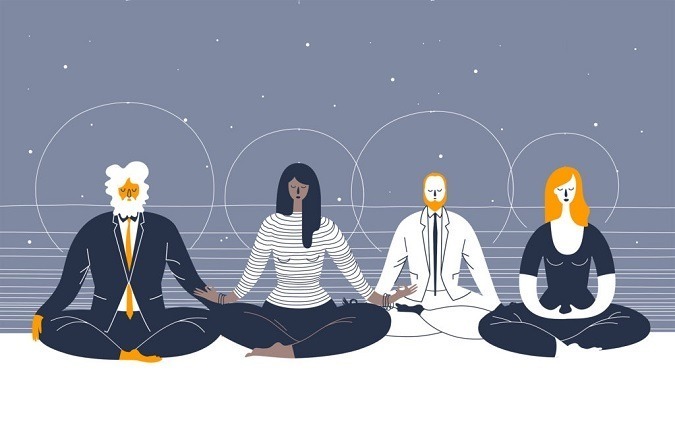Seven evidence-based reasons to start meditating yesterday
 Yes, starting today is OK too.
Yes, starting today is OK too.
I started meditating soon after 9/11. I was living in Manhattan, an already chaotic place, at an extremely chaotic time. I realized I had no control over my external environment. But the one place I did have a say over was my mind, through meditation. When I started meditating, I did not realize it would also make me healthier, happier, and more resilient.
Having witnessed the benefits, I devoted my PhD research at Stanford to studying the impact of meditation. I saw people from diverse backgrounds from college students to combat veterans benefit. In the last 10 years, hundreds of studies have been released.
Here are seven evidence-based reasons you might want to get on the bandwagon as soon as you can:
1. It Changes Your BRAIN for the better
- Increases grey matter (good study here)
- Increases volume in areas related to emotion regulation, positive emotions & self-control (see here and here)
- Increases cortical thickness in areas related to paying attention (see here)
2. It Boosts Your Self-Control
- Improves your ability to regulate your emotions and quiet your mind (see here)
- Improves your ability to introspect (here)
3. It Makes You Wiser
… by giving you perspective. By observing your mind, you realize you don’t have to be slave to it. You realize it throws tantrums, gets grumpy, jealous, happy and sad but that it doesn’t have to run you. Meditation is quite simply mental hygiene: clear out the junk, tune your talents, and get in touch with yourself. Think about it, you shower every day and clean your body, but have you ever showered your mind? As a consequence, you’ll feel more clear and see thing with greater perspective. We can’t control what happens on the outside but we do have a say over the quality of our mind.
Once you get to know your mind, you start to own your stuff and become more authentic, maybe even humble. You realize the stories and soap operas your mind puts you through and you gain some perspective on them. You realize most of us are caught up in a mind-drama and become more compassionate towards others.
4. It Boosts Your Health
- Increases immune function (here and here)
- Decreases Pain (see here)
- Decreases Inflammation at the Cellular Level (See here and here and here)
5. It Improves Your Productivity (yup, by doing “nothing”)
- Increases your focus & attention (here, here, here and here)
- Improves your ability to multitask (see here)
- Improves your memory (see here)
- Improves your ability to be creative & think outside the box (see research by J. Schooler)
6. It Boosts Your Happiness
- Increases Positive Emotion (here and here)
- Decreases Depression (see here)
- Decreases Anxiety (here, here and here)
- Decreases Stress (see here and here)
7. It Boosts Your Social Life
Think meditation is a solitary activity? It may be–depending on how you practice–but it actually increases your sense of connection to others:
- Increases social connection & emotional intelligence (see here and – by yours truly – here)
- Makes you more compassionate (see here and here and here)
- Makes you feel less lonely (see here)
And…the more you meditate, the more you seem to benefit, research studies such as this one suggest.
I know: “I can’t meditate because…”
I hate sitting still—that’s fine, then go for a walk without your earphones, phone etc; or start with yoga; or do breathing exercises…give yourself time to just “be” without constantly “doing” something.
It’s weird—Hmm, what’s so weird about sitting, breathing and being?
I get anxious—that’s normal, all the junk’s coming up, learn some breathing practices to calm yourself down, exercise or do yoga before meditating.
I can’t clear my mind—no worries, while you’re sitting there you’ll experience the noisy chaos of a mind that’s unwinding: tons of thoughts, feelings and emotions. Don’t worry about how you feel during, notice how you feel after and throughout the rest of the day.
I tried and I hated it—there’s not just one kind of meditation, there’s a whole menu out there, look for the shoe that fits: mindfulness, Transcendental, compassion, mantra, Vipassana, Art of Living breathing practices, yoga nidra, yoga, insight, loving-kindness, tai chi etc…
I don’t have time– if you had time to read this article all the way through, you have time to meditate. Think of all those minutes you waste every day on the internet or otherwise, you can definitely fit in 20 minutes here or there to give your life a boost!
Gandhi is quoted as saying “I have so much to accomplish today that I must meditate for two hours instead of one.”
 – Emma Seppälä, PhD, is the science director of Stanford University’s Center for Compassion and Altruism Research and Education and the author of The Happiness Track (HarperOne, 2016).
– Emma Seppälä, PhD, is the science director of Stanford University’s Center for Compassion and Altruism Research and Education and the author of The Happiness Track (HarperOne, 2016).


